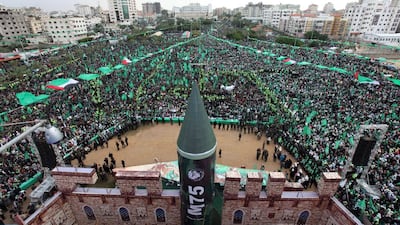Opportunism, prejudices and emotional baggage often interfere with the accurate evaluation of the relationship between the Muslim Brotherhood movement and more extreme Salafist-jihadist groups. At the extremes are ideas promoting a conflation of the two trends in Islamism versus those that suggest Brotherhood ideology is the natural and appropriate corrective to violent extremism.
Both of these assessments are clearly wrong.The Brotherhood is a radical movement, but that doesn’t make it the equivalent of more extreme and violent groups.
But the fact that it is clearly different from groups to its religious and political right doesn’t mean that the Brotherhood is an effective or appropriate corrective to the growth of more violent extremist groups.
The conflation agenda is currently being pushed most vigorously by Israel and its various supporters, particularly in the United States. Ever since the murder of journalist James Foley, they have been pushing the line that “Hamas = ISIL”, trying to draw connections between the Palestinian militant group and the murderous extremists who now control large swathes of Syria and Iraq.
This is pure opportunism, of course. Israeli officials have a long history of doing this. Recall that immediately following the September 11, 2001 terrorist attacks against the United States by Al Qaeda, then-prime minister Ariel Sharon famously pronounced that “Arafat is our Bin Laden”.
Having just emerged from a bruising battle with Hamas in Gaza – which took its toll, among other things, on Israel’s international reputation with more than 2,000 Palestinians killed and a quarter of the population rendered homeless – Israel’s political leadership clearly saw the opportunity to try to score more points with their friends and others by drawing this direct analogy with ISIL.
As with previous uses of this kind of propaganda, its effect is very limited. Even some of Israel’s closest supporters can be seen, quite literally, rolling their eyes at this.
Those who tried to defend the analogy sounded distinctly desperate and flailing. Yet it will have some impact among those already primed not to distinguish too carefully between Islamists.
Yet such a distinction is important where there are obviously clear differences. Otherwise, the policy approach to them will be similarly conflated, and therefore similarly confused.
Groups like Hamas are, in the end, nationalistic ones, rather than global in their perspective. They do not practice “takfir”, as defined by the process of declaring other Muslims to be apostates worthy of death. And their attitude towards others is much more nuanced. The Brotherhood appears to be willing to live with the existing regional and global state system, whereas ISIL is in open warfare with it.
On the other hand, there are those in the United States, as well as in the Middle East and Europe, who overcompensate in the opposite direction.
They have held from the outset of the “Arab Spring” that the Muslim Brotherhood is the only real authentic and legitimate political force among the Sunni Arabs.
Moreover, these voices insist, “moderate” Islamism is the only real hedge against more violent, extreme Islamism.
If only the Muslim Brotherhood were better positioned in the contemporary Arab world to be a major political force, this argument suggests, the more stability there would be and the less appeal more extreme groups would have.
What this argument fails to acknowledge is that in spite of their clear differences, there are also too many points of commonality between the Brotherhood ideology and more extreme groups like the Islamic State for Islamists to check each other.
One of the founding aims of the Brotherhood is, in fact, the restoration of the caliphate.
But while the Muslim Brotherhood doesn’t talk much about the caliphate these days, it hasn’t changed its fundamental attitude either.
Of course, it shares this desire with many Muslims around the world, but the concept has been uninterrogated in any meaningful sense.
No one has really picked apart what this would mean in the present day, who can make such a declaration, and whether it’s really significant or desirable in the modern era. Instead, that has simply left the “caliphate” card to be picked up by ISIL, which has become just the latest in a long line of contemporary claimants.
ISIL is among the most violent groups in the world, and while many Brotherhood-aligned parties have turned away from violence as a primary strategy or publicly-acknowledged policy, it doesn’t have a doctrinal prohibition on violence.
Brotherhood groups have used it in the past, and always made an exception when it comes to the Palestinians – and this long before the advent of Hamas.
Both groups also publicly espouse the virtue and necessity of “jihad”.
Clearly each of them mean rather different things with this same term, but both groups of Islamists appeal to the same core language about “holy war”.
There are just too many common origins for Brotherhood-style Islamism to serve as a plausible corrective to ISIL-style more extreme Islamism.
It’s no coincidence or surprise that it was Brotherhood ideologue Sayyid Qutb who did more to inspire the takfiri and Salafist-jihadist movements than any other modern figure.
If nothing else, Qutb demonstrates the hinge that links Brotherhood-Islamism to more extreme and violent versions now most terrifyingly embodied by ISIL. This is a continuum, not a corrective.
Hussein Ibish is a senior fellow at the American Task Force on Palestine
On Twitter: @Ibishblog


